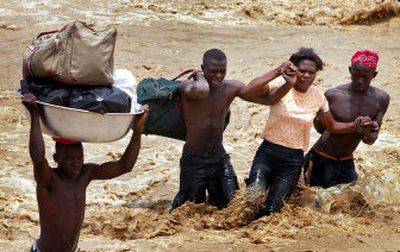Hurricane Dennis hammers Cuba

HAVANA – Hurricane Dennis slammed Cuba’s southern coast with 135 mph winds Friday before slicing across the Caribbean’s largest island, killing at least 10 people. The powerful storm headed toward a U.S. landfall, prompting thousands to flee the Florida Keys.
Strong winds and surf buffeted the U.S. detention camp for terror suspects at Guantanamo Bay, on the island’s eastern end, where a guard tower was washed into the sea. There were no reports of casualties.
“It’s arrived, with all its diabolical force,” President Fidel Castro said on state television. He said 10 people died in southeastern Cuba, including one child who fell into roiling waters as its mother tried to cross an old bridge.
Another five were killed in Haiti, bringing the storm’s overall death toll to 15.
Castro and other authorities were alarmed by the storm’s projected track near the nation’s capital, home to more than 2 million people.
“It is getting dangerously close to the city of Havana,” said meteorologist Jose Rubiera.
An evacuation order was in effect in the Florida Keys, where officials feared Dennis could hit the island chain over the weekend on its way to the Gulf of Mexico.
The storm’s center made landfall on central Cuba’s southern coast in the early afternoon. Civil defense officials said more than 1.5 million people left their homes to take shelter with family or friends or in government refuges.
The storm had strengthened Friday morning to a Category 4 with winds reaching 150 mph but had weakened by evening, though its winds were at a still potent 125 mph. It was the earliest Category 4 hurricane on record in the Caribbean, according to Colin McAdie, a meteorologist with the National Hurricane Center in Miami.
At 8 p.m. EDT, the center was near the central city of Colon, about 65 miles east-southeast of Havana and about 130 miles south-southeast of Key West.
Hours away from Cuba, Dennis struck Haiti and killed five people as it collapsed bridges, triggered landslides, inundated homes and blocked roads with downed power lines and trees.
In Jamaica, a rescue helicopter was to airlift food and emergency supplies to hundreds of stranded islanders in at least seven eastern towns cut off by knee-deep floodwaters, said Nadene Newsome, spokeswoman for the country’s emergency management office.
“Flooding has affected every parish of the island and it will increase as long as the rain continues throughout the day” Friday, she said.
Although Dennis was losing some strength as it passed over Cuba, it was expected to remain a major hurricane as it emerged over the Florida Straits and into the southeastern Gulf of Mexico later Friday evening.
Forecasters predict the storm will hit the United States anywhere from Florida to Louisiana by Sunday or Monday, the fourth storm in as many weeks to disrupt oil production.
The lower Florida Keys, including Key West, were on hurricane warning, while the southern part of the state, including Miami and Naples, were on tropical storm warning.
A hurricane watch was issued for portions of the northeastern U.S. Gulf Coast from the Steinhatchee River westward to the mouth of the Pearl River.
The U.S. detention camp at Guantanamo escaped the brunt of the storm. Heaving surf tore away a lifeguard tower at Windmill Beach and winds destroyed a bus shelter. A few power lines and tree branches were knocked down and there was minor flooding.
“Actually, everybody fared real well,” said Navy Cmdr. Anne Reese.
American troops fixed metal shutters over the steel mesh windows of some prison cells overlooking the sea at Camp Delta, which is just 150 yards from the ocean.
In Haiti, young men were charging $2 to carry travelers and their possessions across the Grand Goave River, which overflowed Thursday and collapsed a 300-foot bridge, killing four people and cutting off Haiti’s southwestern peninsula. Another person was killed by a falling tree.
Fristino Fleurinon, 18, said he carried at least 10 people across the river on his shoulders.
“People have to sell their things, and they have to come and go back to where they came from,” he said.
In Jamaica, floods and debris blocked the road leading from the capital, Kingston, to the storm-battered east around Yallahs town.
The largest and most populous Caribbean island with 11.2 million people, Cuba suffers few hurricane casualties because the government cautiously evacuates people en masse, sometimes forcefully.
The hurricane center’s lead forecaster, Martin Nelson, said it was the first time the Atlantic hurricane season had four named storms this early since record-keeping began in 1851. The season runs from June 1 to Nov. 30.
Last year, four catastrophic hurricanes – Charley, Frances, Ivan and Jeanne – tore through the Caribbean with a collective ferocity not seen in years, causing hundreds of deaths and billions of dollars in damage.